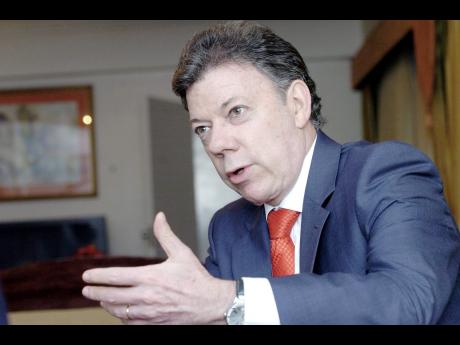Walter Molano | Colombia: Cross currents hit peace accord
Stiff crosswinds are making life difficult for Colombian authorities as they try to secure a peaceful end to decades of civil war, in the process generating a sense of uncertainty and unease.
President Juan Manuel Santos told the population that the country was about to enter a new era of peace and prosperity.
After decades of internecine warfare, Colombia will finally put down its arms and hopefully enjoy the windfall of peace.
Santos promised that billions of dollars in foreign direct investment (FDI) would rain down on the country, allowing it to modernise its infrastructure, expand its minerals sector, fully develop its enormous agricultural potential and take advantage of its well-educated workforce.
Confusion and trepidation
Yet, with days to go until Colombians go to the polls to ratify the agreement, there are voices that say that the country deserves a much better peace accord. Former President Alvaro Uribe is leading the charge, viciously attacking his former protege and defence minister.
However, he is not alone. Former President Andres Pastrana, the architect of Plan Colombia, is also a critic. At the same time, a vast array of politicians and celebrities say the country needs to give peace a chance. This cross-current of opinions is fuelling a general sense of confusion and trepidation.
The criticism is not without merit. The FARC and ELN negotiators did well, even though the government had both guerrilla groups on the ropes.
A glimpse at the treaty verifies its generosity. For example, no guerrillas will have to serve jail time, as long as they confess to all of their crimes and atrocities. They will not need to return any of the billions of dollars that was generated in illegals activities, such as narco-trafficking, extortion and kidnapping. They will be able to field political candidates, with government funding.
Guerrilla combatants will go through reintegration programmes, providing them with money, land and other opportunities. However, most people expect many of them to revert to their nefarious ways. Colombians are braced for an increase in kidnappings, petty crime and the emergence of new criminal gangs.
The only consolation is that the government's security forces will be able to treat these individuals as common criminals and not as members of a political movement. Hence, there should not be any resistance from NGOs or human rights organisations.
Another concern is that the FARC and ELN will soon emerge as the best-funded political parties in Latin America, thanks to their ill-gotten gains. Just as emerging market pundits were heralding a massive swing to the political right, we may see Colombia veer sharply to the left.
This is an observation that could already be reflected in the investor community. Several attempts to place new Colombian instruments have been difficult. The Colombian peso has not appreciated to the same extent as some of its emerging market peers. Likewise, the FDI tidal wave has not materialised. Part of the reason could be the depressed commodity prices.
Still, Colombia should be attracting investment across a variety of other consumer, manufacturing and investor sectors.
These are the reasons why the Colombian economy continues to plod along at a sluggish pace. Finance Minister Mauricio Cardenas insisted at the start of the year that the economy would expand almost 3.5 per cent y/y. Unfortunately, he will be lucky to register a two per cent y/y expansion.
The plunge in oil and commodity prices, along with the deep devaluation of the peso, delivered a powerful blow to the Colombian economy. The slump in oil prices also highlighted the country's overdependence on the volatile commodity. This pushed the fiscal and current account deficits deep into the red.
There is a good chance that the budget shortfall will exceed four per cent of GDP, while the current account deficit was north of six per cent of GDP in 2015.
Rating downgrade possible
The rating agencies are still giving Cardenas the benefit of the doubt, but unless he launches a new fiscal reform before the end of the year, another downgrade will be on the horizon.
The good news is that we believe that oil will continue its upward trajectory, thus reducing the fiscal and external deficits, while boosting the peso. Likewise, Colombian consumers continue to press ahead, despite the various shocks that hit the economy in 2016, as well as a severe inflationary shock, a prolonged trucking strike and the effects of El Nino.
Consumer credit remains strong and the housing sector is not showing any signs of slowing down.
The only question is what will happen with the peace accords. Most polls expect that a large majority of the population will vote in favour. The most pessimistic poll shows an 11 per cent margin in favour of 'yes', and there are other polls that give it a 22 per cent-plus advantage.
There can be no doubt that peace is the optimal outcome. The question is, at what price?
- Dr Walter T. Molano is a managing partner and the head of research at BCP Securities LLC.

